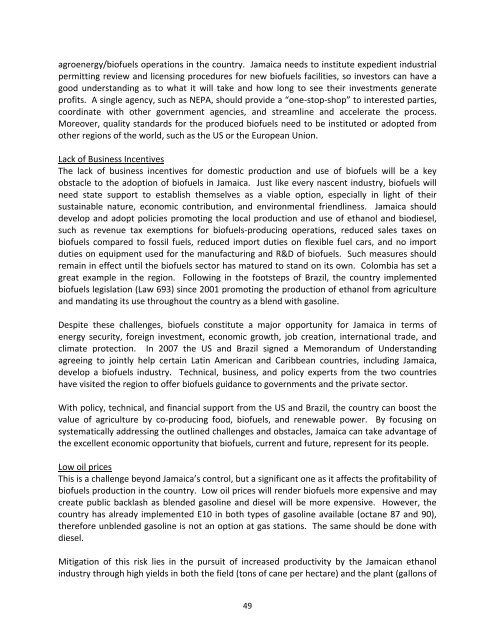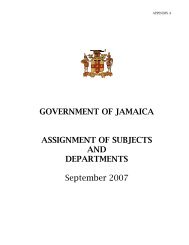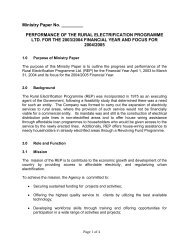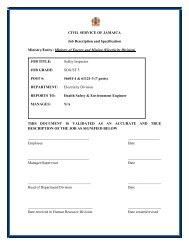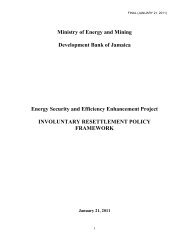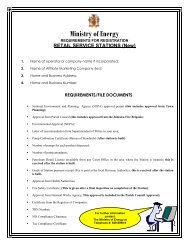Jamaica Biofuels Report - Ministry of Energy
Jamaica Biofuels Report - Ministry of Energy
Jamaica Biofuels Report - Ministry of Energy
You also want an ePaper? Increase the reach of your titles
YUMPU automatically turns print PDFs into web optimized ePapers that Google loves.
agroenergy/bi<strong>of</strong>uels operations in the country. <strong>Jamaica</strong> needs to institute expedient industrialpermitting review and licensing procedures for new bi<strong>of</strong>uels facilities, so investors can have agood understanding as to what it will take and how long to see their investments generatepr<strong>of</strong>its. A single agency, such as NEPA, should provide a “one-stop-shop” to interested parties,coordinate with other government agencies, and streamline and accelerate the process.Moreover, quality standards for the produced bi<strong>of</strong>uels need to be instituted or adopted fromother regions <strong>of</strong> the world, such as the US or the European Union.Lack <strong>of</strong> Business IncentivesThe lack <strong>of</strong> business incentives for domestic production and use <strong>of</strong> bi<strong>of</strong>uels will be a keyobstacle to the adoption <strong>of</strong> bi<strong>of</strong>uels in <strong>Jamaica</strong>. Just like every nascent industry, bi<strong>of</strong>uels willneed state support to establish themselves as a viable option, especially in light <strong>of</strong> theirsustainable nature, economic contribution, and environmental friendliness. <strong>Jamaica</strong> shoulddevelop and adopt policies promoting the local production and use <strong>of</strong> ethanol and biodiesel,such as revenue tax exemptions for bi<strong>of</strong>uels-producing operations, reduced sales taxes onbi<strong>of</strong>uels compared to fossil fuels, reduced import duties on flexible fuel cars, and no importduties on equipment used for the manufacturing and R&D <strong>of</strong> bi<strong>of</strong>uels. Such measures shouldremain in effect until the bi<strong>of</strong>uels sector has matured to stand on its own. Colombia has set agreat example in the region. Following in the footsteps <strong>of</strong> Brazil, the country implementedbi<strong>of</strong>uels legislation (Law 693) since 2001 promoting the production <strong>of</strong> ethanol from agricultureand mandating its use throughout the country as a blend with gasoline.Despite these challenges, bi<strong>of</strong>uels constitute a major opportunity for <strong>Jamaica</strong> in terms <strong>of</strong>energy security, foreign investment, economic growth, job creation, international trade, andclimate protection. In 2007 the US and Brazil signed a Memorandum <strong>of</strong> Understandingagreeing to jointly help certain Latin American and Caribbean countries, including <strong>Jamaica</strong>,develop a bi<strong>of</strong>uels industry. Technical, business, and policy experts from the two countrieshave visited the region to <strong>of</strong>fer bi<strong>of</strong>uels guidance to governments and the private sector.With policy, technical, and financial support from the US and Brazil, the country can boost thevalue <strong>of</strong> agriculture by co-producing food, bi<strong>of</strong>uels, and renewable power. By focusing onsystematically addressing the outlined challenges and obstacles, <strong>Jamaica</strong> can take advantage <strong>of</strong>the excellent economic opportunity that bi<strong>of</strong>uels, current and future, represent for its people.Low oil pricesThis is a challenge beyond <strong>Jamaica</strong>’s control, but a significant one as it affects the pr<strong>of</strong>itability <strong>of</strong>bi<strong>of</strong>uels production in the country. Low oil prices will render bi<strong>of</strong>uels more expensive and maycreate public backlash as blended gasoline and diesel will be more expensive. However, thecountry has already implemented E10 in both types <strong>of</strong> gasoline available (octane 87 and 90),therefore unblended gasoline is not an option at gas stations. The same should be done withdiesel.Mitigation <strong>of</strong> this risk lies in the pursuit <strong>of</strong> increased productivity by the <strong>Jamaica</strong>n ethanolindustry through high yields in both the field (tons <strong>of</strong> cane per hectare) and the plant (gallons <strong>of</strong>49


